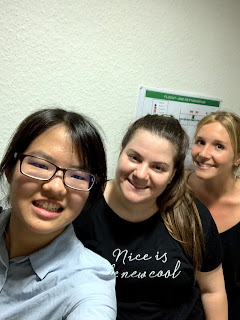醫學六邱莉雯
Katherine Li-Wen Chiu
邱莉雯
Beth Israel Deaconess Medical Center
Plastic Surgery, 2/29/2016~3/27/2016
Student ID:
99001140
Tel: +886912028276
This one month exchange with Harvard
Medical School
at
the Plastic Surgery service of Beth Israel Deaconess Medical Center has been an
unforgettable experience. I gained lots of new and
different perspectives not only
in the medical field, but also in everyday life and interpersonal interactions. I am fluent in English,
so basic
communications weren't an
issue for me. However, the speed in
which they speak medical jargon, the medical abbreviations and even just the pronunciation of
the medical terms took me a while to
get
used to, and even longer for me to
remotely be on par with the residents. There were also a lot of cultural differences that I noticed. Even
something as
small as greeting each
other every day regardless of
whether you
know them personally or not is a scene that
I don’t see often in Taiwan
at all. I also really enjoyed the
atmosphere in the teams there
The medical system and settings in
USA is considerably different than the ones
in Taiwan. I
really like how the attendings in the US spend a lot of time explaining to
each
patient how
everything works, what are the reasons for
doing what they did
and
making sure that the patients
fully understand. This situation is less likely seen in a medical centre in Taiwan
due
to
the large amount of
patients each day. However, for the patients to receive this
level of service from doctors
in the US, lots of money must be invested in
their insurance policies. The medical insurance plays a significant part in determining what type of
medical help patients will receive. Another aspect that
I’ve noticed was that patients in Boston were more educated and expects more from doctors as well.
One of the most important aspects of this exchange for me was meeting the people in Boston.
My
supervisors at my service were all very
welcoming and had
no
qualms with answering all sorts
of questions of
mine. Residents were whom I spent the most time with, as there were no other medical students on the service
at the same time. I would’ve liked to meet another medical student
but
that was not the case for me. This is not a compulsory rotation for medical students, so for two students to
be on the same rotation at the same period of
time
is entirely based
on luck.
At BIDMC, my curriculum comprised of morning rounds, meetings, the OR, clinics,
and consults.
I wasn’t given a set
schedule, nor was I required to be at a certain place at a certain time, besides
morning rounds and meetings. This flexibility allowed me to decide
which procedure to see, or which clinic to attend, which catered to
my interests and expanded my knowledge. Other than learning about plastic
surgery, parts of the Hand Surgery service
overlaps with
the plastic service at BIDMC, so I had the chance of seeing procedures on the hand surgery team as well. I also spent a
day
a week at a hand clinic, either
in BIDMC or in a private clinic. I really enjoyed learning about hand surgery, and saw how precise and delicate a hand surgeon could operate. I could always scrub
in on cases in the OR if I wished to. I
was
also given the chance of
doing
some suturing on small
wounds, but more often than not, I assisted in other basic
jobs and mainly observed. As for ward services, because we are of a surgical
specialty, there wasn’t a lot of
emphasis on this area. I helped
out
with writing basic progress
notes and changing the dressings.
Consults were a lot more
rewarding for me, as I had a chance of sewing up a patient’s laceration wounds on his hands.
It took me a while to finish,
but a hand surgeon fellow complimented me on the job.
This is a service that does not ask students to have responsibilities. This sometimes makes me question whether I really am learning anything or not. The curriculum was so free and what a
student could get out of this rotation is entirely based on the student, so I felt a bit lost. This could
be
because I’ve grown used to the studying and the teaching methods in
Taiwan. I observed a lot of
procedures that aren’t usually
performed at my hospital but are considered as basic
OR procedures
in the US, did some basic
suturing, wrote progress notes, took patient histories, performed basic
hand PE, and helped out whenever I could. I also
helped write consult notes which focuses more on history taking and assessments. Some would argue that I indeed have gained
a lot which I definitely
agree in some aspects. In others, I feel like I am just there to stand in as an extra pair of
hands.
Furthermore, at my level of
education at the moment, and the fact that I am not set on plastic
surgery, I feel that the plastic service is too specialized. The discussions between residents and attendings were usually on
how
to perform the procedure, where to draw the markings, what are the aesthetic effects, etc, which in my opinion, is more beneficial at a later stage in my life.
Nevertheless, I definitely benefitted from doing my rotation for
a month at BIDMC. I became more independent, learned how to work in a completely different environment, and made some important connections. I also could see what it
is like to practice in the US first-handedly, thus giving me different views on the same profession.





留言